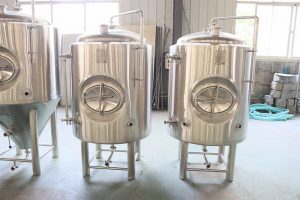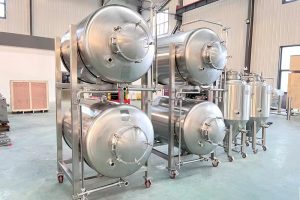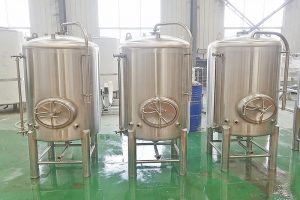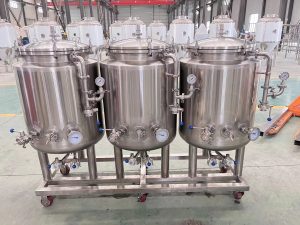Professional bright Beer tank manufacturer from China
The bright tank is a vessel for storing and carbonated beer, it is also called the brite tank. The bright tank is an important part of the workflow of professional beer brewers. It can be used to store and carbonate beer, thus eliminating the trouble of cleaning beer barrels. The brite tank with many functions can be used as a traditional brite tank or as a service vessel. If you pursue the clarity and carbonization of craft beer, then you must need a bright tank.
Micet Craft can provide you with bright tanks ranging from 1BBL to 300BBL. We can also provide you with professional brewing solutions.

3.5BBL Bright Tank
Previous slide Next slide The 3.5bbl bright tank is made of food-grade 304/316 stainless steel and manufactured by high-quality standards. Every bright tank produced by Micet Craft has undergone 48

3BBL Bright Tank
Previous slide Next slide The 3bbl bright tank manufactured by Micet Craft is mirror polished with a polishing accuracy of up to 0.4μm. The bright tank allows the brewer to

2BBL Bright Tank
Previous Next Like our other bright tanks, this 2bbl bright tank can clarify beer efficiently and provide more benefits to beer brewers. The butterfly bottom allows the yeast or floccules

1BBL Bright Tank
Previous slide Next slide 1bbl bright tank is a container that can mature and store 1bbl beer. It is not necessary to divide the beer into kegs or bottles for
Frequently asked questions about bright tank
A bright tank is a tank used to clarify beer and beer carbonation, and is also called a “brite tank”. In most breweries, the fermented beer will leave the fermentor, be filtered, and transferred to the bright tank for further clarification and maturation of the beer. If you want to force carbonation of beer, you can also do it in a bright tank. After carbonation, the beer can be barreled or bottled directly. Because the bright tank is the last stop before packaging, so you need to pay extra attention at this stage.
Although the engineering and functions of bright tanks are not as complicated as brewery equipment or bottling lines, these containers have important functions. A brite tank is a container placed after primary fermentation and filtration of beer. It can further mature, clarify and carbonate the beer, and can also be stored and used for packaging beer. In brewpubs, the brite tank can even be used as a service container, thus playing a dual role. The temperature in the brite tank is very important. The fermenter needs to be operated at 68-72°F, but the brite tank needs to be operated near the freezing point (32 °F) to ease the proper absorption of carbohydrates by beer.
It mainly depends on your brewing process and beer style. For pale beer, the clarification step cannot be omitted, you need to transfer the beer from the fermentation tank to the bright tank. If you brew a strong beer and don’t want the wine to be transparent, then you don’t need to use a bright tank. Also, unitank with carbon fossils has the same function as the bright tank, and you can also use unitank to clarify your beer.
Of course, a bright tank is the last step in making beer. In these containers you can get clarified and drinkable beer, so you can use it as a serving tank to sell beer.
Some of our customers will ask why they want to use the bright tank? Why not choose to buy more Unitank (fermentation tank)? Although different customer requirements and brewing methods are different, we still hope to help you answer this question.
1.Release fermenter
If you need to pack beer, you usually need a brite tank for every 4-5 fermentation tanks. Beer needs to be stored in the fermentation tank for 10-20 days, while it only needs to be stored in the bright tank for 2 days. This is to make the beer clear and to carbonate the beer.
2.Clarified and complete transfer yeast
The bright tank can help clarify the beer, but also allows you to transfer yeast in a more complete way. When you pull the yeast from the fermentation tank, you will leave a layer of yeast on the fermentation tank. Due to the similar charge, the yeast prevents other yeasts from accumulating, which has a significant effect on the clarity of the beer. The brite tank has a butterfly-shaped bottom, which makes the final flocculated yeast stay at the bottom and cannot enter the package or the final beer of draft beer.
3.Easy to measure the volume of canned beer
Usually, you get 100% beer in the Brite tank, which helps you plan the packaging. Conical storage tanks always leave a part of the beer. This is because the content of yeast sediment will vary. You never know how much beer you want to drink. Due to the known volume, the bright tank can also be easily determined for taxation.
The main difference between them is the shape. The body of the unitank is cylindrical, but the bottom is tapered. Unitank is great for fermentation and aging because its shape creates space for yeast to accumulate at the bottom for water filtration.
Benefits of using unitank
- Simplicity: Ability to combine fermentation and aging steps, simplifying the brewing process by removing one step. Because of this, breweries can purchase less equipment, saving the brewery money and space. Of course, it also saves time and labor for workers, who don’t need to move beer from one point to another and can also dispense beer directly from the unitank.
- Reduced risk of contamination: Every time beer is removed from the fermenter, it is exposed to air, which leads to dissolved oxygen. This can cause some problems if you plan to pack and distribute beer outside the pub. In addition, beer may be exposed to other contaminants such as microorganisms, and while these organisms are not lethal, they can cause some unpleasant odors. Using unitank reduces this risk of contamination.
- The larger volume of beer production: Some breweries brew very large volumes of beer, and brewing and packaging are two separate processes. In this case, fermenting the beer and serving the beer needs to take place in two separate areas in the brewery, which also makes the use of unitank impractical. The brewery needs to remove the beer from the fermenter and put it into the bright tank. It makes it easier to pack beer and free up fermentation tanks for the next batch, allowing the brewery to produce more beer.
- Improve clarity: Bright beer tanks are called “bright” because the beer they produce is crystal clear. When the beer enters the bright tank from the fermenter, the yeast is first filtered out. This extra layer of filtration produces a clearer beer, which some breweries prefer, before further maturation and carbonation.
Unitank is perfect for microbreweries and brew bars. For these facilities, space is often limited the volume of beer produced is not large, and the focus is not on the packaging but on serving beer directly to customers. Unitank will work very well in these situations because it saves space and labor without compromising the productivity of the packaging team.
Bright tanks are more suitable for mass production, especially those that rely on packaging and transporting most of the product. A brite tank allows you to release more fermentation tanks at once, and because a brite tank can hold more liquid, it is better suited for larger brewery production. In general, if you need to brew more beer, a brite tank might be a good idea.
It all depends on the number of fermenters, the time spent in the fermenters, and the throughput of the packaging line. Assuming you have 10 fermenters, the average time per fermenter is 14 days, and your packaging equipment can empty a brite tank in less than 1.4 days, then you only need one brite tank.
You also need to consider the time to CIP cycle the brite tank. Also, keep in mind that packaging lines are huge complexes of moving parts that can fail multiple times per run.
Contact us for the bright tank price
If you want to know more about the brite tank, you can contact us at any time. Of course, if you want to expand the output of the brewery, we will also provide you with the corresponding brewery equipment and design a customized turnkey brewery solution for you.
